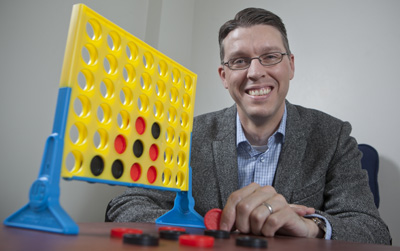
Study targets risk factors for depression
A Binghamton University psychologist plans to recruit 1,000 area families to participate in a new study aimed at identifying risk factors for childhood depression and anxiety.
Brandon Gibb, associate professor of psychology and director of clinical training at Binghamton University, said he’s interested in genetic and environmental factors that may contribute to anxiety and depression. Identifying such factors early — he’s studying 7- to 11-year-olds — may make it easier to figure out which children need extra help before they hit the turbulence of adolescence.
The study will zero in on “attentional biases,” which occur when children and adults focus their attention too much on, or have difficulty pulling their attention from, something negative or threatening in such a way that it affects their mood for a prolonged period.
“We like to think of things in evolutionary terms,” Gibb said. “It’s an advantage, if you see something threatening in your environment, to pick up on it quickly so you can either fight it or run away. However, if you are constantly looking out for danger even when you are in an objectively safe environment, that can lead to problems with anxiety. With depression the attentional bias appears to be different; there’s no bias in where you initially attend. But once you get stuck on something negative, then you have a hard time pulling yourself away from it.”
As Gibb embarks on this four-year study, with $2.9 million in support from the National Institute of Mental Health, he’s also wrapping up an earlier project. In that study, 255 children and their mothers were assessed every six months for two years. The team is still analyzing its data, but Gibb said it’s already clear that children whose mothers have experienced depression have a higher risk of being depressed themselves. Their lives also have a lot more stress. “If you have a mom with a history of depression,” he said, “your life is more stressful: at home, at school and with your peers.”
That project has informed the new one, and Gibb said he and his colleagues hope to find out more about which components of attention are disrupted in depression and anxiety. “We’re trying to tease apart what’s unique to one or the other as well as what’s shared by both disorders,” he explained.
Read more about the study in Discover-e.







